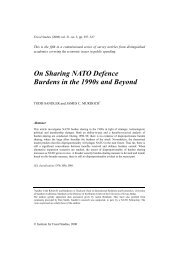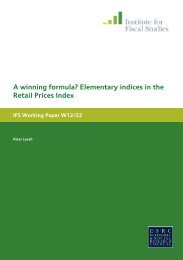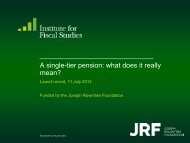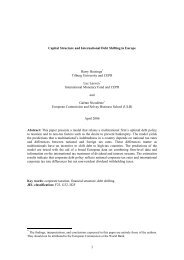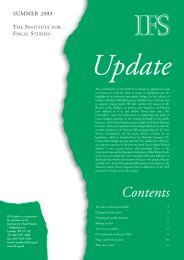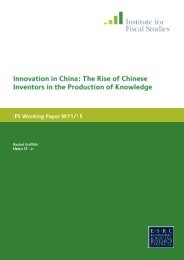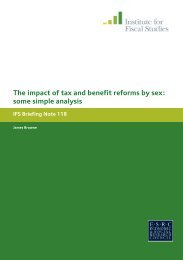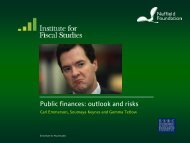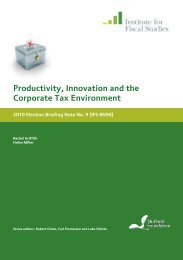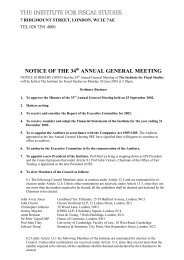Download full version (PDF 431 KB) - The Institute For Fiscal Studies
Download full version (PDF 431 KB) - The Institute For Fiscal Studies
Download full version (PDF 431 KB) - The Institute For Fiscal Studies
- No tags were found...
You also want an ePaper? Increase the reach of your titles
YUMPU automatically turns print PDFs into web optimized ePapers that Google loves.
Unearned income will reduce Universal Credit payments pound-for-pound, arate which is identical to that in the current set of means-tested benefits, buthigher than currently applies under tax credits. Capital rules in UniversalCredit mean that families with more than £16,000 of financial capital will notbe entitled to any Universal Credit at all. This is no change from the currentmeans-tested benefits, but a dramatic change from tax credits, where asimilar amount of savings would merely reduce tax credits awards by, atmost, £1.42 a week.Who will win and lose and how much will it cost?<strong>The</strong> report analyses the likely winners and losers from Universal Credit, andits impact on work incentives. Using assumptions very similar to thoseunderpinning the Government’s analysis in its White Paper – which assumed<strong>full</strong> take-up of benefits, and ignored any behavioural impact of UniversalCredit – the analysis suggests that:the long-run cost of Universal Credit will be around £1.7 billion (in 2014–15 prices);2.5 million families will gain, and, in the long-run, 1.4 million families willlose and 2.5 million families will see no change in benefit and tax creditentitlement;Universal Credit will benefit poorer families more than richer ones, onaverage. <strong>The</strong> bottom six-tenths of the income distribution will gain onaverage, while the richest four-tenths will lose out slightly in the longrun;On average, couples with children will gain more than couples withoutchildren, who will in turn gain more than single adults without children.Lone parents will, on average, lose in the long-run. But there will bewinners and, in the long-run, losers amongst all family types.If, as should happen, Universal Credit increases take-up, then the number offamilies gaining and the cost to Government might be higher. And if UniversalCredit encourages more people to work, this might reduce the cost toGovernment. <strong>The</strong> Government intends that no current recipient of benefits ortax credits will lose out at the point of transition to Universal Credit, and thistransitional protection will increase the cost to Government, and reduce thenumber of families losing, in the short-run. (<strong>The</strong> report also presents resultswith this transitional protection.)How will it affect work incentives?<strong>The</strong> report also examines how Universal Credit will change financial workincentives.One measure of the extent to which taxes and benefits weaken the incentiveto work at all is the participation tax rate (the fraction of earnings lost toincome tax, national insurance and withdrawn benefits or tax credits whensomeone moves into work). <strong>The</strong> report finds that Universal Credit will reducethe number of individuals who face a participation tax rate of 70% or more by1.1 million, but will increase the number of individuals who face aparticipation tax rate of 60% or more by 350,000.<strong>The</strong> Universal Credit will strengthen the incentive to work at all, on average,particularly for those who have the weakest incentives to work under thecurrent tax and benefit system, namely very low-earning single people andprimary earners in couples. However, Universal Credit will weaken incentivesto work for (potential) second earners in couples, who see Universal Credit<strong>The</strong> <strong>Institute</strong> for <strong>Fiscal</strong> <strong>Studies</strong>Limited by Guarantee,Registered in England: 9546167 Ridgmount StreetLondonWC1E 7AE



